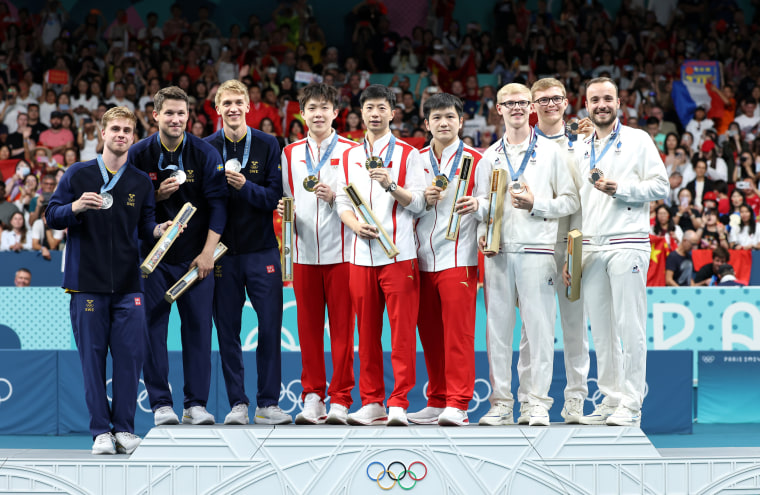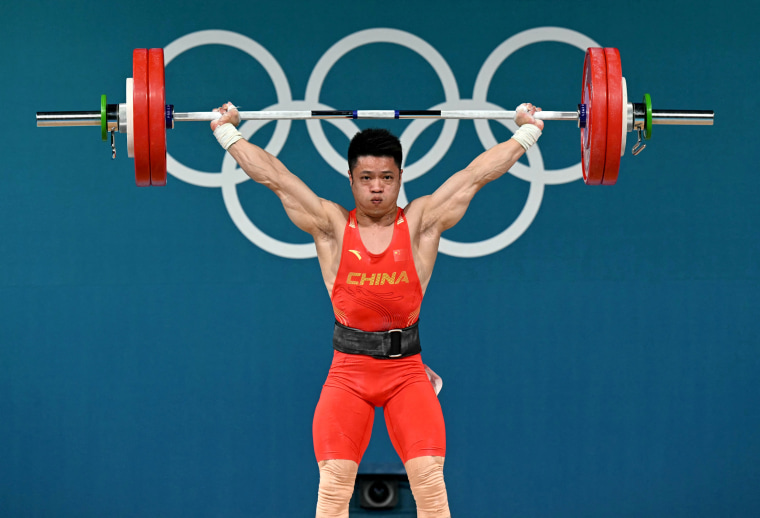PARIS — Everywhere you looked heading into the 2024 Paris Games, the Americans dominated. Team USA sent by far the largest number of athletes. Hordes of tourists dressed in stars and stripes crossed the Atlantic. And celebrities like Snoop Dogg and Lady Gaga have become cultural icons of the Games.
However, there is one crucial metric in which the United States has not surpassed the competition: gold medals.
On the last day of the Games, China is leading Team USA in the medal tablewith 39 gold medals against 38 from America. (While the American news media typically bases itself on medal totals, most of the rest of the world, including the official Paris 2024 count, bases its table on gold medals won.)
While the US team focuses on track and field and swimming, China specializes in diving, table tennis, weightlifting, shooting and badminton. In fact, about a fifth of China’s 302 gold medals since 1984 have come from diving. This year was no different, with China winning every available gold medal.
“I am very proud of China and all the gold medals it has won,” said Fang Zheng, 30, a Chinese student studying in France who was lining up to watch the launch on Friday. “When an athlete wins gold, it is an honor for themselves and their family, but also for the country.”
This year, China is also making advances in disciplines typically dominated by the US, namely swimming. His two gold medals here included the 4×100 meter medley, the first time in Olympic history that anyone beat the U.S.
The star of the show was Pan Zhanle, who pulled away from American Hunter Armstrong on the anchor leg, having already set a world record in the 100 meter freestyle five days earlier. The losing American team included 10-time Olympic medalist Caeleb Dressel, who had to settle for silver.
Meanwhile, Zheng Qinwen became the first Asian tennis player to win women’s gold, and China’s winning artistic swimming score blew the US and Spain out of the water. The Chinese choreography, “Light of Life,” impressed the judges by creating a physical representation of the “mountain” the team had to overcome to win gold. Although Russia, a long-time dominant force in the sport, was excluded from these Games, China still achieved a score that far surpassed any competitor.
“Their execution is out of this world,” said Jacklyn Luu of Team USA.
China has also been quick to adopt some of the newer Olympic sports, including sport climbing, skateboarding, surfing and breakbreaking. Deng Yawen won gold in the women’s freestyle BMX in her Olympic debut. And China also has the youngest athlete at these Games, 11-year-old skater Zheng Haohao.
China’s new skill in the pool has not gone without significant scrutiny, however, after it emerged that 23 swimmers – including 11 who went to Paris – tested positive for heart medications banned in 2021 but were still allowed to compete.
China’s anti-doping agency said they had eaten contaminated food, an explanation accepted by the World Anti-Doping Agency, WADA, which did not make the incident public until it was publicized. revealed by a New York Times investigation earlier this year.
China vehemently denies doping allegations, with a Foreign Ministry spokesperson telling NBC News last month that “Chinese swimmers are clean and have never feared testing.”

They also accused the US anti-doping agency, USADA, of double standards after it was revealed that the Americans allowed athletes who tested positive between 2011 and 2014 to continue competing if they went undercover to catch other dopers.
China has also focused on American sprinter Erriyon Knighton, who tested positive for the performance-enhancing drug trenbolone in March but, like the Chinese athletes, was cleared after his own country’s agency said he had eaten contaminated meat.
The current Olympic rivalry between the US and China is part of a geopolitical sporting duopoly that has existed since around 2004. Although the US tends to win, when Beijing hosted the Games in 2008, it swept the field with 51 gold medals to the team’s 36 from the USA.
How this happens is no secret and in many ways is similar to the US and other countries.
The country has injected more and more funding into the Games, while also focusing on specific sports that it knows will return a good number of honors. Having 1.4 billion people doesn’t hurt, of course, although, as India will attest (no golds, one silver and five bronzes in Paris this year), having a colossal pool of potential talent doesn’t guarantee success.
The last time an opaque, one-party state, accused of running a doping program, rivaled the USA in the medal table was the Soviet Union.
In those Cold War times, China’s Olympic program was still in its infancy.

After the 1949 communist revolution, Chinese leader Mao Zedong promoted exercise not only as an athletic imperative – building a strong, healthy working class and defending the nation – but also as a cultural and political necessity. This “would serve the political purpose of building a class of citizens who are well disciplined in both mind and body,” according to the Michigan-based nonprofit Association for Asian Studies. in its Education About Asia magazine.
And at the Helsinki Olympic Games in 1952, China saw what a powerful geopolitical weapon the Olympic Games could be. The Soviet Union achieved enormous success, placing the United States close to the medal table and showing “how a socialist country could defeat Western democratic countries on the international stage,” said the essay in Education About Asia.
However, China would only win its first medals for 30 years, after withdrawing from the International Olympic Committee in protest against the participation of Taiwan, which it considers a rogue province that rightfully belongs to Beijing.
The international sports freeze began to thaw in the 1970s, first with the historic “ping pong diplomacy” of 1971, in which the US table tennis team became the first international sports delegation to visit China in decades. paving the way for a visit by then- President Richard Nixon a year later. This direction of travel was further accelerated in the late 1970s with the “reform and opening up” policies enacted by Deng Xiaoping after Mao’s death.
China finally returned to the Los Angeles Games in 1984, following an IOC agreement that called for Taiwan to compete under the name “Chinese Taipei.” Beijing quickly became a medal machine, rising to Beijing in 2008. This landmark event in the country’s modern history coincided with its meteoric economic rise, while the West suffered from the financial crisis of the same year.

Amid strong criticism, the IOC stated that these Games would help revolutionize politics and human rights in what was then the most populous country in the world. That never happened.
Under President Xi Jinping, who came to power four years later, China has become more authoritarian, according to Western governments and watchdogs, an assessment Beijing rejects.
Today, all countries see success at the Games as a way of projecting power internationally. But China takes this to a whole new level, where not only are diamonds seen as a totem of nationalist pride, but silvers are often criticized on Chinese social media.
Meanwhile, its State Council swore make China “a leading modern socialist sporting country by 2050” and its “global influence on sport should be ranked near the top globally”.
And in this new era of Sino-Western rivalry, the Olympic Games are also used by more nationalistic elements in the Chinese media as a way to portray China in a positive light against the perfidious Americans and Europeans. The doping argument at these Games only intensified this dynamic.
“The US use of its influence and hegemonic power to contain China and other competitors in sports is truly disgraceful and unsportsmanlike,” sports commentator Li Xiang told the hawkish Global Times newspaper on Friday. China, on the other hand, “demonstrated charm and sportsmanship in Paris, as young Chinese athletes won the friendship and respect of their rivals and foreign audiences,” Li said.
This story originally appeared on NBCNews.com read the full story





































